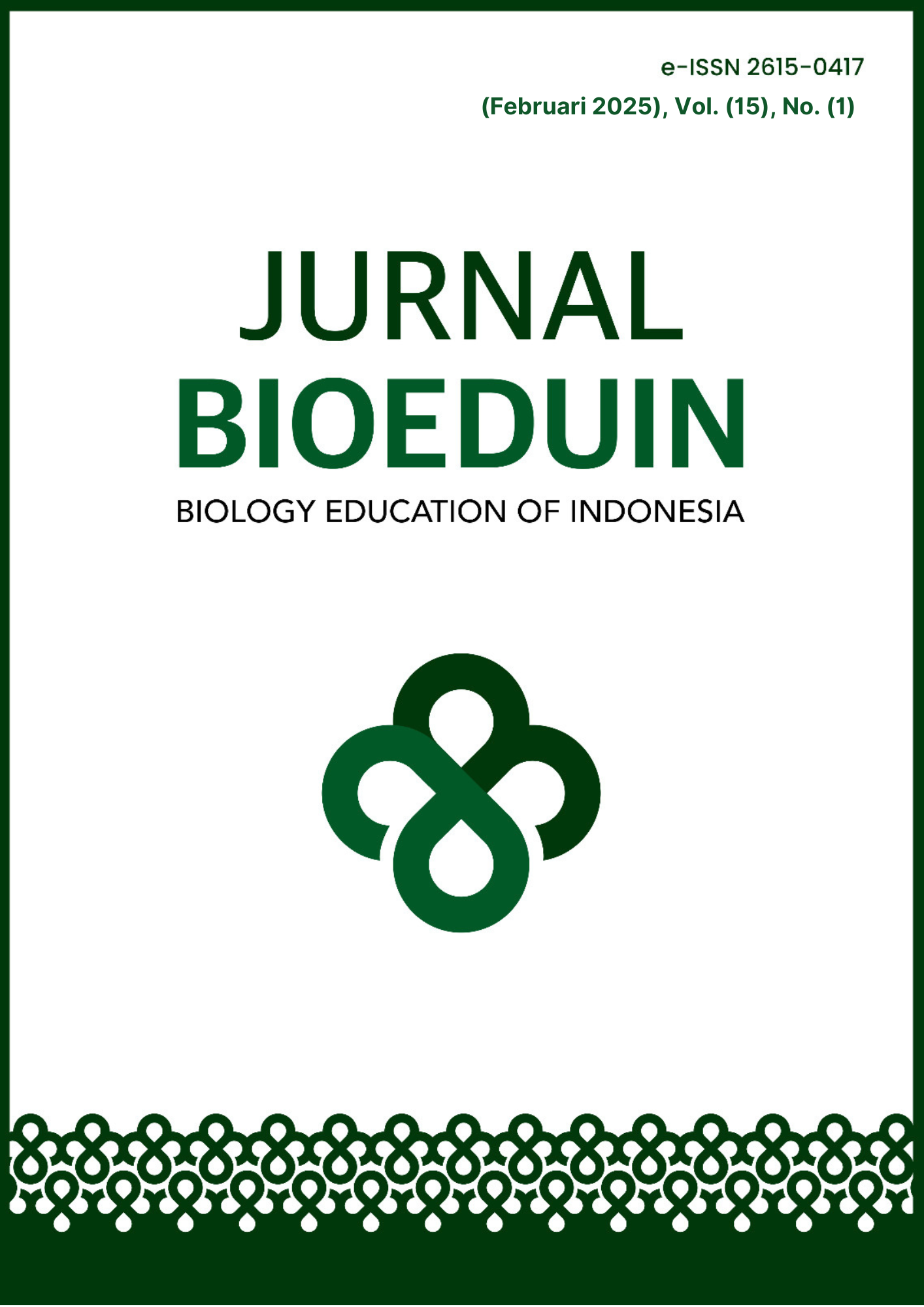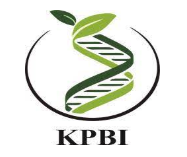Boys and Girls in Developing Scientific Literacy Through PBL Supported by ClimateClass
DOI:
https://doi.org/10.15575/bioeduin.v15i1.39792Keywords:
climateclass application, problem based learning (pbl), scientific literacy, genderAbstract
This study examines the effectiveness of the Problem Based Learning (PBL) model supported by the Android application ClimateClass in developing students' science literacy skills. Science literacy is crucial in the 21st century as it equips students with the necessary skills to make informed decisions in a technology-influenced society. Despite Indonesia's participation in international programs like PISA, the level of science literacy in the country remains low, indicating the need for innovative educational strategies. This quasi-experimental research used a pretest-posttest non-equivalent control group design conducted at SMA Negeri 1 Padang Cermin Pesawaran with a sample of 36 students from Class X.2. The intervention involved the implementation of the PBL model with the ClimateClass application to facilitate a more interactive and problem-solving-focused learning environment. Data were collected using a science literacy test and a questionnaire and analyzed using ANCOVA to determine the significance of the intervention. The results showed that the use of the PBL model supported by the ClimateClass application significantly developed students' science literacy, particularly in identifying scientific issues, explaining scientific phenomena, and using scientific evidence. Moreover, the study found no significant differences in science literacy achievement between male and female students, indicating that gender does not affect learning outcomes in this context. These findings highlight the potential of integrating digital media into educational models to create an equitable and effective learning environment in the digital era.
References
Ajai, J., & Imoko, B. (2014). Gender Differences in Mathematics Achievement and Retention Scores: A Case of Problem-Based Learning Method. International Journal of Research in Education and Science, 1, 45-50.
Anggun, D. P., Alberida, H., & Ardi. (2018). Pengaruh Penggunaan Papan Buletin dalam Model Pembelajaran Aktif Tipe Index Card Match ( ICM ) terhadap Kompetensi Kognitif Siswa SMA. JEMST, 1(2), 34–39.
Ashari, S., Rachmadiarti, F., & Herdyastuti, N. (2023). Analysis of the Science Literacy Profile of Students at State Junior High School. IJORER : International Journal of Recent Educational Research.
Aydoğan, E., Atik, A., Dikmen, E. Ş., & Erkoç, F. (2021). Development and usability testing of an educational mobile learning app for climate change and health impacts. Turkish Journal of Biochemistry, 47, 373-383
Cho, E. (2022). Cultivating Science Literacy Through the General Education Curriculum. The Korean Association of General Education.
Harianto, A., Suryati, S., dan Khery, Y. (2017). Pengembangan Media Pembelajaran Kimia Berbasis Android untuk Penumbuhan Literasi Sains Siswa Pada Materi Reaksi Redoks dan Elektrokimia. Hydrogen: Jurnal Kependidikan Kimia, 5(2), 35-47.
Hasasiyah, S. H., Hutomo, B. A., Subali, B., & Marwoto, P. 2020. Analisis Kemampuan Literasi Sains Siswa SMP pada Materi Sirkulasi Darah. Jurnal Penelitian Pendidikan IPA (JPPIPA). 6(1). pp. 5-9
Hermansyah, H. (2020). Problem Based Learning in Indonesian Learning. In Social, Humanities, and Educational Studies (SHES): Conference Series, 3(3), 2257-2262.
Huryah, F., Sumarmin, R., & Effendi, J. (2017). Analisis Capaian Literasi Sains Biologi Siswa Sma Kelas X Sekota Padang. Jurnal Eksakta Pendidikan (Jep), 1(2), 72.
Istighfarini, M. D., Supeno, S., dan Ridlo, Z. R. (2022). Pengaruh Media Aplikasi Berbasis Android terhadap Literasi Sains dan Hasil Belajar IPA Siswa SMP. LENSA (Lentera Sains): Jurnal Pendidikan IPA, 12(1), 61-70.
Kristyasari, M. L., S Yamtinah, S B Utomo, Ashadi, & N Y Indriyanti. (2018). Gender Differences in Students’ Science Literacy towards Learning on Integrated Science Subject. Journal of Physics: Conf. series. 1-8.
Kurniawati, K., dan Hidayah, N. (2021). Pengaruh Pembelajaran Problem Based Learning Berbasis Blended Learning terhadap Kemampuan Literasi Sains. Bioedusiana: Jurnal Pendidikan Biologi, 6(2), 184-191.
Kusumawardhani, R., Suryati, S., dan Khery, Y. (2017). Pengembangan Media Pembelajaran Berbasis Android untuk Penumbuhan Literasi Sains Siswa Pada Materi Sistem Periodik Unsur. Hydrogen: Jurnal Kependidikan Kimia, 5(2), 48-56.
Mahanal, S., Zubaidah, S., Mukti, W., Agustin, M., & Setiawan, D. (2021). Promoting male and female students’ scientific literacy skills through RICOSRE learning model. , 2330, 030047.
Maharani, A., Azizah, I. M., Astari, M. T., Wigati, I., Oktiansyah, R., & Hapida, Y. (2019, December). Kemampuan Literasi Sains Berdasarkan Gender Dalam Pendidikan. In Prosiding Seminar Nasional Pendidikan Biologi (Vol. 2, No. 1, pp. 62-67).
Novita, Desi, A.S., Ani. R., Murbangun. N. (2017). Pengaruh Pembelajaran Berbasis Proyek terhadap Kemampuan Literasi Sains Siswa. Pancasakti Science Education Journal. 2(2), 114- 124.
OECD. (2023). PISA 2022 Results (Volume II): Learning During and From Disruption. Paris: OECD Publishing.
Putra, A. D., dan Salsabila, H. (2021). Pengaruh Media Interaktif dalam Perkembangan Kegiatan Pembelajaran Pada Instansi Pendidikan. Inovasi Kurikulum, 18 (2), 231–241.
Putri, P., Tukiran, T., & Nasrudin, H. (2018). The Effectiveness Of Problem-Based Learning (Pbl) Models Based On Socio-Scientific Issues (Ssi) To Improve The Ability Of Science Literacy On Climate Change Materials. JPPS (Jurnal Penelitian Pendidikan Sains).
Rahayu, S. (2017). Mengoptimalkan Aspek Literasi dalam Pembelajaran Kimia Abad 21. In Prosiding Seminar Nasional Kimia UNY, 21(4), 183-188.
Riduwan. (2009). Skala Pengukuran Variabel-Variabel Penelitian. Bandung: Alfabeta.
Rosyadah, Windy. M., Irma. D.Y., Yuliskurniawati, Nurul. I. N., Susriyati. M., Siti Zubaidah. (2019). A Survey of High School Students’ Scientific Literacy Skills in Different Gender. The International Seminar on Bioscience and Biological Education. 1-8.
Syahputra, E. (2018). Pembelajaran Abad 21 dan Penerapannya di Indonesia. In Prosiding Seminar Nasional Sains Teknologi Humaniora dan Pendidikan (QSinastekmapan) (Vol. 1).
Widiana, R., Maharani, A. D., dan Rowdoh, R. (2020). Pengaruh model problem based learning terhadap kemampuan literasi sains siswa SMA. Ta'dib, 23(1), 87-94.
Downloads
Published
How to Cite
Issue
Section
Citation Check
License
Copyright (c) 2025 Wisnu Juli Wiono, Ismi Rakhmawati, Yudianto

This work is licensed under a Creative Commons Attribution-ShareAlike 4.0 International License.
Authors who publish in Jurnal BIOEDUIN agree to the following terms:
- Authors retain copyright and grant the journal right of first publication with the work simultaneously licensed under a Attribution-ShareAlike 4.0 International (CC BY-SA 4.0) License that allows others to share the work with an acknowledgment of the work's authorship and initial publication in this journal.
- Authors are able to enter into separate, additional contractual arrangements for the non-exclusive distribution of the journal's published version of the work (e.g., post it to an institutional repository or publish it in a book), with an acknowledgment of its initial publication in this journal.
- Authors are permitted and encouraged to post their work online (e.g., in institutional repositories or on their website) prior to and during the submission process, as it can lead to productive exchanges, as well as earlier and greater citation of published work (See The Effect of Open Access).









